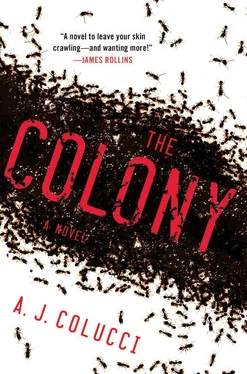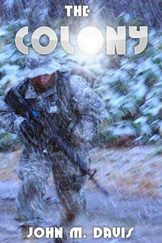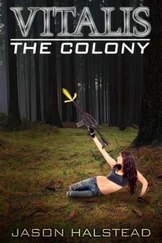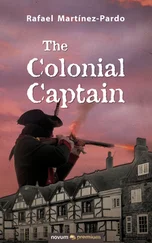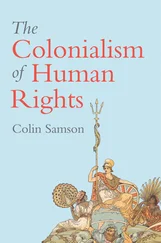“That must be it,” Paul said. At the end of the tunnel was a steel door cut into bedrock and a sign marked NO ACCESS—AUTHORIZED PERSONNEL ONLY. A sensor for a card key was placed beside the door, along with a final warning that entering was strictly forbidden without authorization. Paul took out his ID.
“Sure you’re authorized?” Kendra asked.
“We’ll know in a second.”
He slid the plastic through the scanner and the light blinked red. He tried again; still red. He turned it around, upside down, rubbed it on his pants and bent it straighter; red, red, red.
“Damn.” He sat down and leaned against the cold metal door.
Kendra took the card from his hand and glided it gently through the slot. The light flashed green. The door slid open with a swish.
“Ah. Must have loosened it,” he said, as they crouched through the doorway.
They were at the bottom of a circular pit dug from the earth. A black light in a metal cage gave their skin a blue zombie-like sheen that matched the glistening surface of the rough bedrock walls. Kendra’s white shirt and Paul’s lab coat glowed bright violet. There was a damp, clammy texture to the air, along with the sound of a slow water drip somewhere.
“Where the heck are we?” Kendra asked, her voice rising into an echo.
“The end.”
“The end of what?”
“The end of the bunker,” he said, looking at the diagram. “I suppose this is the way out for any survivors of a nuclear catastrophe.”
“There’s no elevator or even a door.”
“No. Just a hatch, way up at the top.”
“Where?”
“Up the ladder,” he said, pointing to the map. “Far end of the wall.”
She walked over to a steel ladder painted red and looked up into the darkness, already feeling dizzy. “Wonder how high it goes?”
“Mayor said we’re three hundred feet below sea level.”
“Great.”
“I can promise you sky at the top. It looks like all we have to do is open a hatch door and you’re out in the cool air.”
“Yeah, like you opened the last door.”
“Hey, we could go back to the ant maze, hunker down in the laboratory and share a bologna sandwich.”
“Now you’re being an ass. Let’s go.”
They began to climb.
* * *
Night had fallen. The horizon was a marvelous smear of pink and lavender, the sun just a sliver between two skyscrapers. Paul and Kendra emerged from the bunker onto the roof five stories above the streets. She was out of breath and shaking from the climb. A cold wind chilled the air but the blacktop was still warm and spongy. Kendra breathed deeply into the breeze, relieved to be outside again.
“How does it feel?” Paul shouted over the wind.
“Great. But it’s cold.”
He took off his lab coat and swung it gently over her shoulders. Kendra turned from him, feeling suddenly self-conscious, but Paul wrapped his arms around her waist. He leaned over her warm cheek and smelled the scent of honeysuckle and desert sand in her hair, touched the short blond locks and examined them curiously.
“New look?” he asked.
“New everything,” she answered.
“Well… I like it.”
Kendra was fairly sure he hated it, but was glad he hadn’t said so.
“I missed you,” he whispered.
“So what happened, Paul?”
“I don’t know. My job. Your job. I guess whatever we had just slipped away.”
No, she thought. Not for me. Kendra walked to the edge of the roof. Below, the East River shimmered like glass and to the west endless smokestacks stood against the deepest blue.
“Eight million people,” she said. “What if the ants really do launch an attack? It might happen any day. Next rainfall, next high tide or some other trigger.”
Paul followed her to the ledge. “We’re going to destroy these monsters. Then maybe we can put us back together.”
“I can’t play second fiddle to your career again.”
He nodded, knowing he’d screwed up the first time.
Kendra’s gaze drifted to the skyline. Twilight brought out the stars in the east and they twinkled.
“I’d forgotten about the lunar eclipse.” She was staring at the moon, an oversized sphere of orange, slowly darkening to red. “My students will have some crazy day with the ants. An eclipse always sends them into a… frenzy.”
Kendra gaped at Paul, his face as stark as her own.
THE FIRST SOLDIER APPEARED on Ninth Avenue, along a strip of soil lined with dogwood trees. From the center of a mound, a hole sprang open. The ant peered out, her oversized head pivoting right and left like a water sprinkler. Over jewel-cut eyes stretched long antennas, wiggling fingers assessing wind currents and ground cover. Her exceedingly long jaws were shaped like elephant tusks and could pierce through a rattlesnake.
Like a leviathan from the deep, the ant emerged. Her sleek black body was immaculate, as she was compulsively neat and incessantly cleaning herself. The ant stood on hind legs and her head sprang up toward the cool night sky like that of a hunting dog sniffing for scent.
Prey was detected in every direction. It was a go.
In an instant, holes burst open and soldiers poured out like a treacherous river, at a rate of six hundred thousand per minute, swallowing the soil and small tufts of sprouted grass.
The regiment didn’t have to go far. A man, known only as Phil, was passed out in a nearby alley with an empty bottle of vodka in his soiled lap. The procession gathered at his feet and spread around his body like the chalk tracing of a homicide victim. They climbed up his dirty tennis shoes and into the pant legs. They charged up his neck and across his torso, raiding a flimsy undershirt.
Phil was nearly covered in ants by the time the first bite was taken. Like razor-sharp hedge cutters, mandibles snipped and slashed, repeating the process again and again.
The old man stirred, and then groaned, as smaller soldiers rushed into the bloody area quickly, strong jaws chewing the softer inner flesh. Even 90-proof alcohol was not enough to anesthetize the pain. Phil flailed helplessly under a growing weight across his chest. But such thrashing was useless and brief. While the sensation from a thousand living stings was excruciating, paralysis from the toxins set in quickly, and all he could do was shriek inside his mind as the agony continued.
Ants spilled across his bloated face, searching for the most succulent flesh. The thin skin of the eyelids was a delicacy and they sliced it up quickly, boring into the soft eye tissue.
Some tunneled into nostrils, all the way to the sinus cavities and down the throat, while others pushed through parched lips, engorging the mouth and continuing down passageways to the lungs and esophagus.
Once these fragile areas were reached, the ants inserted their tubes and pumped their liquefying agents into the flesh. A new round of formic acid was released, drawing thousands of other ants. As the enzyme traveled through his body, Phil lost all movement and faculties. Brain cells were bursting. Liver and kidneys ceased functioning. Every muscle broke down to a rubbery mass, and thick blood passed through veins as soft as noodles. The entire torso was marbled a dark purple from pools of massive hemorrhages under the skin.
Finally, a ripping sound came from Phil’s trousers like a burst of flatulence. It wasn’t air he expelled but an explosion of his stomach and intestinal lining and a tremendous amount of blood. It seeped out through his baggy pants and trickled down the alleyway.
After Phil was blinded, asphyxiated and nearly skeletonized in about nine minutes, the army moved out. Partly through instinct and partly through genetic mangling, Siafu Moto were programmed to exterminate; feeding the colony was crucial but secondary. The ants set off on their next mission, heading toward a brick apartment building and leaving a deadly pheromone trail in their wake.
Читать дальше
